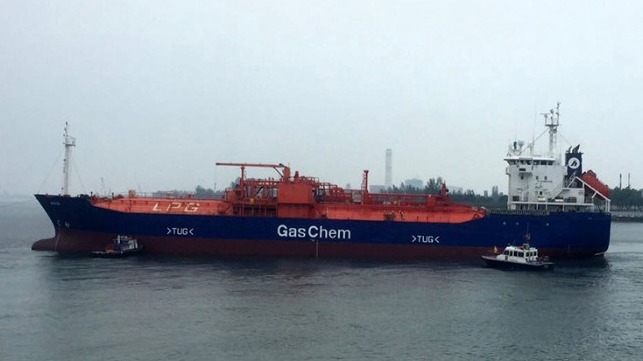Hartman to Build Ammonia-Fueled Ships with MAN Engines for OCI Charter

In an effort to propel the commercialization of ammonia-fuel vessels, OCI, a Dutch fuel provided, announced the second of two agreements reached with a major shipping company. OCI said it will work with MAN Energy Solutions and Hartmann Gas Carriers to start the commercialization of ammonia as a marine fuel. This agreement is in addition to another agreement with Eastern Pacific Shipping which will focus on methanol in the near-term with a longer-term conversion to ammonia.
These agreements are part of an initiative by OCI to take an early leadership in the emerging markets. According to the company, ammonia and methanol, OCI’s core products, are the only practical alternatives for long-distance shipping. With global infrastructure in place, it says these products can bridge the transition from “grey” to “green” until the industry has fully scaled up to products based solely on renewable energy sources.
The agreement with Hartman Gas Carriers Germany calls for Hartmann to build and operate ammonia-fueled vessels owned by its GasChem Services subsidiary. MAN will design the ammonia-fueled engines working in conjunction with the partners. OCI intends to charter the vessels once built and the partnership will also explore retrofits of existing vessels.
According to the partners, shipping will be one of the hardest sectors to decarbonize due to the cost effectiveness of heavy fuel oil and dispersed nature of refueling operations. However, when compared to hydrogen and LNG, they believe that ammonia offers significant advantages to help the maritime industry meet its targets for reducing emissions. OCI highlights that ammonia is widely used and easier to store with extensive global distribution and storage infrastructure in place.
“Hartmann Gas Carriers Germany together with their commercial arm, GasChem Services in Hamburg, are convinced of the opportunities that ammonia-fueled vessels will offer to the environment,” said Capt. Alfred Hartmann, Chairman of the Supervisory Board of the Hartmann Group and President of German Shipowners’ Association. “At a time when the maritime industry is at the dawn of a new era and looks for options to decarbonize shipping, we are proud and excited to be part of this highly innovative, future-looking project. The new vessel type will enable us to reduce carbon emissions significantly and set new standards for environmentally-friendly shipping.”
The emergence of ammonia and methanol as the most logical alternative to conventional fuels presents a large opportunity for OCI. The company has made it a top priority to make these established low carbon fuels for shipping and is accelerating the transition to produce additional blue and green ammonia and methanol at its plants. They believe that converting all long-distance shipping to methanol would require about 650 to 720 million tons annually by 2050, which is six to seven times the current total global methanol production. Similarly they estimated that the shipping industry will require approximately 750-900 million tons of ammonia annually by 2050, which is four to five times the current total global ammonia production.

that matters most
Get the latest maritime news delivered to your inbox daily.
“Ammonia and methanol are the fuels of the future and we are excited to continue to play a part in the transition to zero carbon in a cost-effective way through these partnerships,” said Ahmed El-Hoshy, Chief Executive Officer of OCI N.V. “We believe the push towards low carbon fuels in the coming years will be met with the adoption of both methanol and ammonia as industry standard. We see this as starting with the adoption of grey/blue methanol and ammonia and then shifting to green as production costs come down, customer appetites move towards green and regulations continue to develop.”
MAN agrees also saying that methanol and ammonia are very interesting candidates as zero-carbon fuels. As a leading engine manufacturer MAN is pursuing opportunities working to develop the next generation propulsion systems. MAN has already introduced a methanol-burning two-stroke engine, while expects to deliver the first ammonia-fueled engine in 2024.
